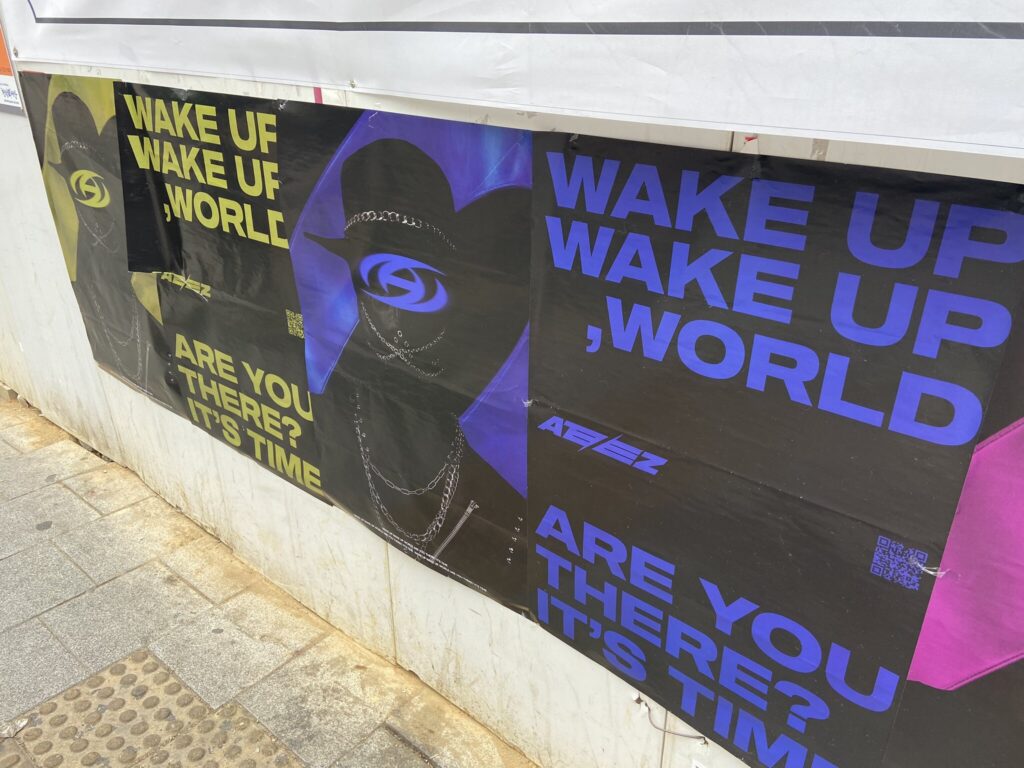In this episode of Cultura, Rana shows how South Koreans are just as crazy as the rest of the world when it comes to K-Pop

Walking down the street of Myeongdong, Seoul, you might be greeted by numerous skin-care brands with K-Pop idols as their brand ambassadors. These K-Pop idols — their real-sized standee or full window stickers would be placed in front of the stores to promote their skin-care brands. Their songs would be played from when the store opened to when it closed. If you buy a certain number of products, you will be rewarded with a merchandise or two from the idol who promotes the said skin-care brand. This would explain why many fans choose to religiously buy tons of skin care to own their preferred idol’s merchandise.
Living in Korea for four months as an exchange student proves to me how big the Hallyu Wave is in its home country. While K-Pop has been around for more than 30 years (starting from the late 80s), its popularity has been skyrocketing not only in Korea’s society and globally. K-Pop in South Korea has become a culture of the country itself.
Each K-Pop group has their own fans and name for their fan clubs. These fan clubs would rent billboard advertisements to promote their favourite group, often congratulating the group when a member has their birthday, all with their own money or from a share-funding initiative of the people in the fan club. Some fans would also make a birthday celebration by renting a whole cafe dedicated to their favourite idol and decorating the entire cafe with their favourite member’s pictures.

These fans would also buy hundreds of K-Pop albums. While buying one album seems sufficient, each album contains one ticket to the meet and greet event, usually called Fan-Sign in the K-Pop term. The Entertainment company would later draw a raffle from all the tickets inside those albums and choose 10 to 20 people to do a Fan-sign event. The more albums you buy, the higher your chance to win the raffle and meet your favourite K-Pop idols.
This method has caused controversy among people in South Korea. Buying one to ten albums is possible, but hundreds of them would mean taking away someone’s space, whether of the meet and greet opportunity, or simply their sole interest in the album. Fans would end up throwing those albums into the streets for other fans to take without any charge or donate them to the library. While it is promoting the idols, it is useless outside the
K-Pop circle and ends up being nothing but trash. These K-Pop albums have become as bad as the clothes in the fast fashion industry.
Although some Koreans don’t like K-Pop, K-Pop has become one of the country’s objects of pride. BTS, a K-Pop boy group who recently took over the world by staying at the number 1 chart of Billboard’s Hot Trending Songs chart for 14 weeks, got invited by the former South Korean President to receive a special envoy certificate. “As BTS has delivered messages of comfort and hope to the world over the years, BTS’ participation in the UN General Assembly will serve as a meaningful opportunity to expand communication with future generations around the world and elicit sympathy for future generations on major international issues,” the official account of Blue House tweeted.

S, a woman in her 20s, said she likes K-Pop because the music and the whole industry are so interesting. “They would have concept photos, teasers, or sometimes quizzes for the fans to guess at some extent before releasing their new songs or music video clips,” S said, “They also have weekly music shows and annual music awards, consistently,” she added. “It is a very interesting industry.” Hallyu Wave has taken over South Korea and the world with their K-Pop, K-Drama, K-Film and K-Beauty Products. South Korea didn’t achieve it in one night; their influence has been implemented since a long time ago and has finally bloomed now. Their persistence and work ethic are worth learning from to become a better nation.
References
Blue House [@TheBlueHouseKR]. (2021, September 14). Tweet [Tweet]. Twitter. https://twitter.com/TheBlueHouseKR/status/1437646462263857154
O. (2021, May). K-pop and Wastefulness: The Consumer Wasteland. Seoulbeats.Com. Retrieved May 31, 2022, from https://seoulbeats.com/2021/05/k-pop-and-wastefulness-the-consumer-wasteland/
Oh, I. (2013). !Cross-Currents: East Asian History and Culture Review E-Journal No. 9 (December 2013) • (http://cross-currents.berkeley.edu/e-journal/issue-9) !!! K-pop in Korea: How the Pop Music Industry is Changing a Post-Developmental Society. !!Cross-Currents: East Asian History and Culture Review E-Journal No. 9 (December 2013) • (Http://Cross-Currents.Berkeley.Edu/e-Journal/Issue-9) !!! K-Pop in Korea: How the Pop Music Industry Is Changing a Post-Developmental Society, 9, 111–112. https://www.researchgate.net/publication/265835985_K-pop_in_Korea_How_the_Pop_Music_Industry_Is_Changing_a_Post-Developmental_Society

Created by : Rana Zhafirah Apriliani Sultan
Rana is thriving a 4th year Interior Design Student at the Faculty of Art & Design, Institut Tekonologi Bandung. She’s interested in illustration, graphic design, and background art. Now, after taking a Digital Journalism course in Hanyang University, she has taken an interest interest in making short stories and drafts.

There are interesting facts that some of us didn’t know before!
Thank you for the article. It really enriched my knowledge about K-Pop industry and how it is becoming one of the biggest income of the country. I myself, a fan of BTS, and amazed with their hard work and achievement.
Anyway, a very organized and interesting writing! 👍🏾👍🏾